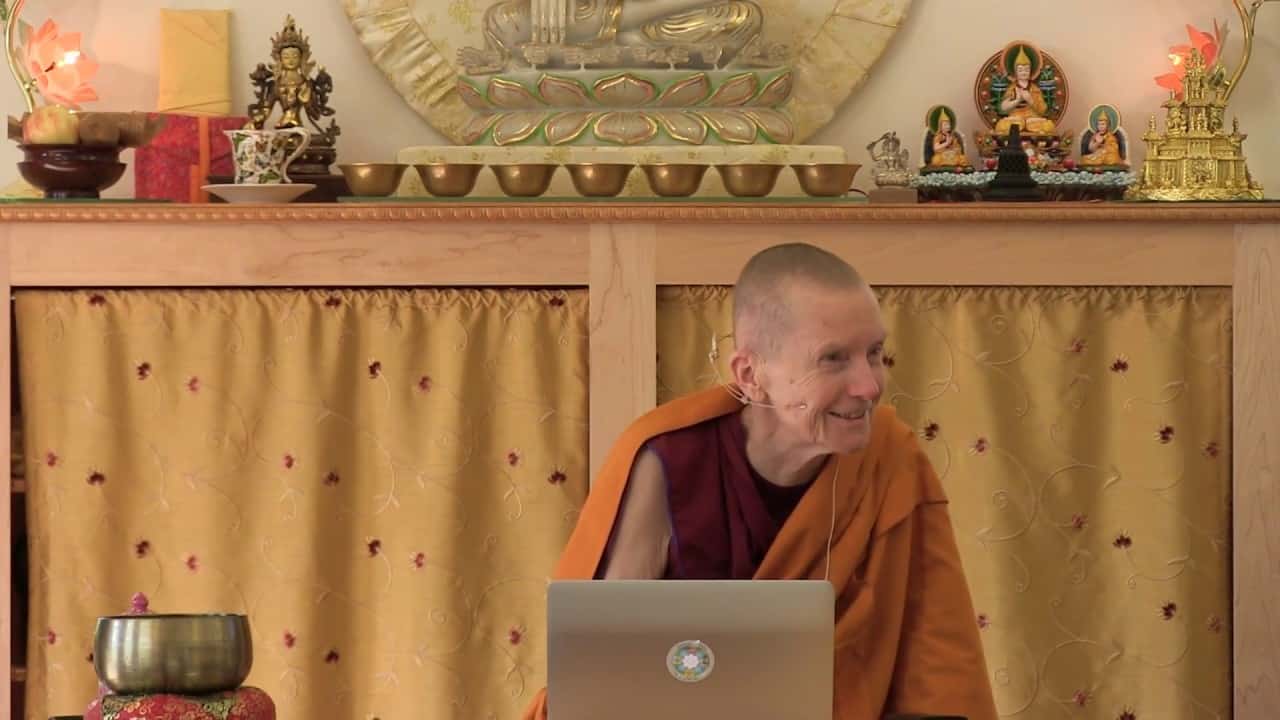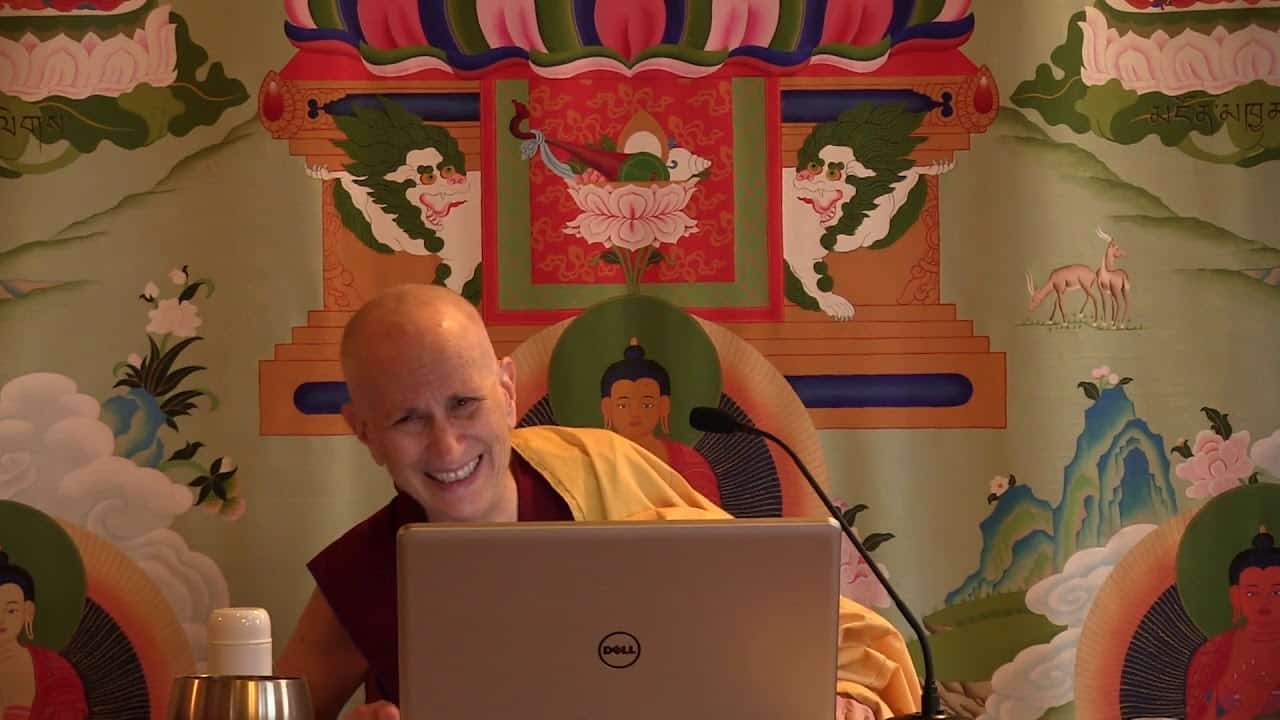How to recognize or identify our afflictions
Part of a series of short Bodhisattva's Breakfast Corner talks on Langri Tangpa's Eight Verses of Thought Transformation.
- Continuing on verse three of the Eight Verses Of Thought Transformation
- How the body and mind give us clues when afflictions are at play
In all actions I will examine my mind
And the moment a disturbing attitude arises
Endangering myself and others
I will firmly confront and avert it.
Yesterday I was saying we need conscientiousness that cares about virtue and nonvirtue. We need to identify virtuous and nonvirtuous mental factors in our own mind. We need mindfulness and introspective awareness in order to recognize them.
How do we recognize them?
Some people can recognize afflictions when they’re in their mind by seeing physical reactions. Often certain emotional states will bring physical reactions. For example, when you’re getting angry, your heart beats faster, your face gets flushed, your stomach gets tight, your muscles get tight. Sometimes if you’re really furious, you can feel the veins in your neck pulsating.
Have you ever seen people who are really mad? This is what it’s like.
The idea is, don’t wait until you’re that mad to tune into your body, because by that time you’re gone. But what is very helpful is to monitor our physical reactions in our body just as we monitor our mind throughout the day so we can detect things when they’re small.
Noticing physical changes is a way to help you notice the mental changes, then tune into that and see. Be able to detect when you’re stomach is tightening a little bit with anger. Or when your heart is just starting to race a little bit with anger.
With attachment, too, depending on what kind of attachment. If it’s attachment to somebody else’s body, or romantic attachment, you get physical symptoms from that, too. That can help you realize, “Oh! Something’s going on here and I’d better deal with it.” Again, if the physical things are too strong, you’re gone, and it’s very difficult, because the affliction is so strong, to bring your mind back.
You want to really be able to see things when they’re smaller. Sometimes really watching your breath. If you get in tune with your breath, you can really see emotional changes through your breath. And sometimes when you’re with other people, too, if you pay attention to their breathing, you can tell something about their emotional state, too.
It’s very interesting, sometimes if you’re trying to help someone, to breathe at the same rhythm that they do. It gives them a feeling of being understood. And then slowly change your breath, and that can help you calm down–if it’s you you’re watching–or it can actually help the other person calm, too.
Watching your body is one way. Watching your mind is another way to detect when afflictions have arisen, and here what you want to look out for is what I call the flavor of the mind. You may have another term that you want to use, that’s fine with me. But it’s the mood, the flavor, the feeling inside my mind. There are certain kinds of feelings I get of happiness or unhappiness, certain flavors, that when I feel that I know, oh, I’d better stop and see what kind of thought and what kind of emotion is lying behind that.
Sometimes it’s something a little bit rattling, or feeling a little bit ill at ease. It might be because I’m being attached to reputation, or attached to what people are thinking about me, so I’m getting a little nervous in the situation, wanting to make sure I’ve got my bases covered and nobody’s going to think anything bad.
Sometimes there a more irascible feeling in my mind, and then I know, okay, anger, annoyance, irritation, those are coming, it’s time to chill out.
Again just watching the mood, or flavor, in your mind can give you information about whether afflictions are arising. That’s something to really pay attention to.
You can do it in your meditation. You’re doing your normal lamrim meditation, or visualization, or whatever, and then if a distraction comes with some kind of affliction, then pause, and what’s the flavor of my mind when that distraction is there? Then you can begin to see the flavor of the mind associated with the mental state, and then that can be very helpful for when you’re outside of session. If you have that same mental feeling, then you might have the same affliction, so you can identify it that way.
Is that making some sense, if you pay attention?
Sometimes there’s just a feeling of resistance in the mind. There’s a certain feeling, for me, at least, that accompanies resistance. Resistance is a kind of laziness, but it’s a feeling like, “I just don’t feel like doing this now.” I don’t know how to describe that feeling, but that’s the talk behind it. Then okay, that’s coming in my mind. What am I going to do about that one?
Just to learn about how our mind functions. And similarly, to be able to identify virtuous mental states in our mind, so we can tell the difference. Like I was saying before, that a happy feeling can indicate virtue, it can also indicate non-virtue. Similarly, unhappy feeling can indicate virtue or non-virtue. So you watch those feelings, and then you see, what is the mind that is causing them?
If, after you meditate on the defects of samsara, your mind feels pretty sober, and you’re not in the mood to go smile and woopity-do, don’t criticize yourself for being in a bad mood. Because actually, you’ve understood something really important in the Dharma, and it’s not the usual bad mood. It’s a, “Oh this wasn’t what I thought it was” kind of soberness.
Do you get what I’m saying when I say “sober”? When you’re sober after you’ve been high, you’re seeing things clearly, but you’re mind is not bouncy. Just because you’re not feeling so bouncy, don’t think that you’re doing something wrong. You could have really understood something quite important in your meditation.
Of course, if you’re going on the depressed side, then maybe you’re misunderstanding things. So watch the different states of your mind.
Similarly, when you’re happy, it could be a feeling of rejoicing at others’ virtue, at your own virtue. Or sometimes happiness can just be, “Oh, somebody likes me,” or, “I just got praised, got my way…,” in which case, that’s not a virtuous state of mind.
It takes some time and some finesse to be able to recognize what kind of mental factors are in our mind. This is why we study the mental factors, and this is why we study lorig. Not so we can make lists of different things, and debate this, and that, and the other thing. It’s so we can recognize these different mental states in our mind, because then that helps us increase the virtue and dampen on the non-virtue. Always keep that in mind when you’re doing study on lorig, or mind and mental factors, the different kinds of awarenesses.
Venerable Thubten Chodron
Venerable Chodron emphasizes the practical application of Buddha’s teachings in our daily lives and is especially skilled at explaining them in ways easily understood and practiced by Westerners. She is well known for her warm, humorous, and lucid teachings. She was ordained as a Buddhist nun in 1977 by Kyabje Ling Rinpoche in Dharamsala, India, and in 1986 she received bhikshuni (full) ordination in Taiwan. Read her full bio.


